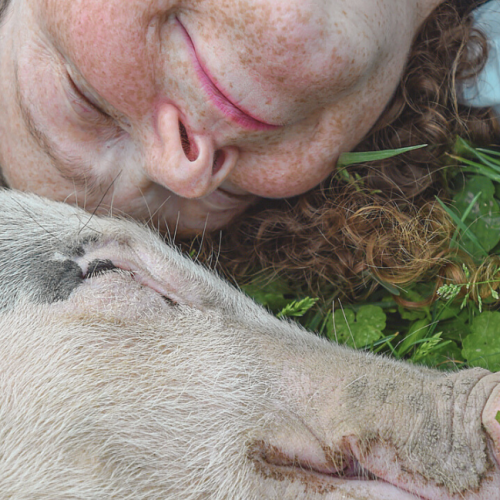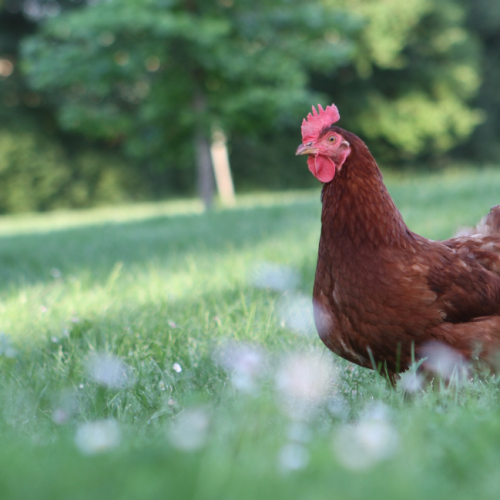Simple Swaps: Save cows, ditch the dairy
Milk, cheese, butter and other dairy products are pretty much everywhere in Western diets. The dairy industry has done a great job of making us think they're essential - sewing dairy products into our cultural fabric.
The market for dairy products is now worth hundreds of billions of dollars annually, and is expected to grow significantly in the coming years, with growing demand for dairy products in emerging markets.
Despite their popularity, dairy products make a significant contribution to catastrophic climate change, and degrade and damage the natural world. Dairy products are also especially harmful to cows, and pose many health risks to humans.

Dairy comes with health risks
About 65% of the world's population is intolerant to lactose - a sugar found in milk and dairy products - causing symptoms such as bloating, gas, diarrhea, and abdominal pain.
Studies have also linked dairy to an increased risk of breast, ovarian, and prostate cancers. A simple swap from cows milk to soy milk is associated with a 32% lower risk of breast cancer in women. While for men, eating soy products, including tofu and soy milk, is associated with a 30% reduced risk of prostate cancer.
Be mindful of studies that boast the benefits of dairy consumption, they are often funded by industry giants such as Nestle, creating a conflict of interest in research and make their findings highly unreliable.
Dairy: a cruel and unsustainable industry
Just like us humans, a dairy cow only produces milk when she has a baby to feed. Dairy cows must give birth to one calf per year in order to continue producing milk, and they are often artificially inseminated within just three months of giving birth.
Every year, millions of calves are either sent to slaughter or killed on farms shortly after birth. These calves, often referred to as 'bobby calves', are considered economically insignificant and are separated from their mothers at a young age.
The production of dairy products also leads to the confinement, torture and abuse of over 200 million cows each year, along with generating more than 300 million tonnes of greenhouse gas emissions annually, exacerbating global warming.
Knowing all this, it becomes a no-brainer to reduce our dairy consumption as much as possible. We can choose milk with a kinder story. With a growing variety of calcium-rich, dairy-free alternatives, it's never been easier to enjoy delicious dairy-free products.
Read on to discover our favourite dairy swap ideas to help you get started.

Milk & Yoghurt Swaps
We’re often told to drink cow’s milk for calcium. However, cow’s milk is not the only source of calcium. Reach for the calcium-fortified plant milk instead! Soy milk, our go-to, is just as high in calcium and protein as cow’s milk, yet lower in calories, and produces only a third of the greenhouse gas emissions.
Here are some of our favourite milk alternatives and what you can do with them:
Alternative Milks
Soy Milk: High in protein, low in fat, and rich in omega-3 fatty acids. Soy is great for replacing milk in tea & coffee, on your cereal, and using for baking cakes and pastries. It's also a good option for making vegan mayo. And don't forget the pancakes - we love this Chocolate Pancakes recipe!
Almond Milk: Full of good fats, low in carbs, and packed with Vitamin E, almond milk is great for warm drinks like your morning latte, a spicy chai, or a festive egg-less nog.
Oat Milk: Packed with fatty acids, protein, and dietary fibre, Oat milk is good for warm drinks, like coffee, adding to your morning smoothie, to make soups and curries creamy, and it's even great stirred through your mash potato!
Coconut Milk: High in saturated fat, so we reccomend using sparingly, but coconut milk is delicious to cream up curries, especially in Thai curries, like this Red Thai Curry recipe.
Rice Milk: Naturally creamy, sweet and naturally low in saturated fats, rice milk is good for your immune system and for those with oat, nut or soy allergies. Great for cereals, tea and coffee.
Pea Milk: Pea milk is one of the closest plant-based alternatives to cow's milk, with higher levels of protein and calcium. Another great option for those with oat, nut or soy allergies.
Hemp Milk: Rich in brain and immune boosting omega-3 and omega-6 fatty acids, hemp milk is nutty, earthy and slightly sweet. It's also another great higher protein, lower carb option.
Yoghurt
Soy Yoghurt: High in protein and calcium, soy yoghurt is also low in saturated fat, and can help to lower cholesterol. Soy yoghurt is great to replace where you would use yoghurt in cooking, or served with granola and/or fruit.
Coconut Yoghurt: Higher in saturated fat, but oh-so-delicious, coconut yoghurt is a great for desserts, pancakes, and served with fruit etc - definitely a sometimes food.
Cream
Oat Cream: Low in saturated fat, oat is a delicious cream alternative that can be used for whipping and cooking.
Cashew Cream: Cashew is high in calories due to it's fat content, however unlike it's dairy counterpart, it's heart-healthier unsaturated fats. Great for adding to sauces and pastas, and super easy to make at home.
We recommend you give all of these alternatives a try to see which one is your favourite in terms of taste, texture and richness. We are sure that you’ll fall in love with at least one of them.

Cheese Swaps
Cheese made from cows milk is extremely popular for its rich umami taste. The most consumed types of cheese are highly processed (i.e. shredded mozzarella, American cheddar, etc), which are not only addictive (due to the casein) but also devoid of nutrients.
Here are some great alternatives:
Nutritional Yeast
Instead of cheese, reach for the equally cheesy nutritional yeast (Nooch), packed full of Vitamin B12. Nooch adds a cheesy flavour to scrambled tofu and creamy sauces, is great for seasoning your popcorn and veggies (like Kale Chips), and for sprinkling onto salads. It's also a great substitute for parmesan.
Cashews
Cashews make an excellent creamy cheese sauce, just by soaking in water and adding a few herbs and spices. Cashews are rich in fiber, protein, and healthy fats, along with several minerals, making them healthier than using heavy cream in your dishes. If you want to get really experimental, you can also use cashews to make a firmer cream cheese - great for entertaining and cheese boards! Cashews also make an exceptional cheesecake filling!
Cauliflower
Cauliflower is packed with vitamins C and K, and is high in folate. It's a great low calorie vegetable, so it may surprise you that it can make a decadent creamy sauce or cheese. Roasted potato and roasted cauliflower are great for using as a base to a cheese sauce with blended cashews, water, herbs and spices. Cauliflower also makes an excellent and incredibly creamy alfredo sauce for using in pastas, white based pizza, and wherever else you fancy!
Supermarket and speciality 'cheeses'
Supermarket vegan cheeses are an easy option for replacing your every day cheese for sandwiches, burgers and lasagne for example. These are often made from coconut oil, so we reccommend going easy on them portion-wise. Nut cheeses are next-level decadent and perfect for a cheese board! Often you will find dairy-free variations on smoked cheeses, goats cheese, feta and even haloumi!

Butter Swaps
Butter is a dairy product that consists of mostly fats, and is therefore very high in saturated fats. Saturated fats have been linked to higher cholesterol and greater chance of heart disease. It is best to avoid butter, and try one of these alternatives instead:
Extra virgin olive oil
Olive oil is great as a spread or a dip for bread, and much better for your health as well due to it's antioxidant and vitamin content.
Plant-based spread
These days there are an array of plant-based spreads in the supermarket, ranging from sunflower, to olive, to cocnut spreads. Word on the street is that even Lurpak are finally getting involved in the plant-based spread business.
Avocado
Is there anything better than avocado on toast!? Mashed avo can be just as creamy as butter, and unlike butter, avocados are high in heart healthy, monounsaturated fats. Check out this super creamy Whipped Avocado Toast recipe by Richard from School Night Vegan. Avocado is also great in baking and deserts... avocado chocolate mousse is a real treat!
Recipes
Swapping out dairy doesn’t mean compromising on health and taste. There are so many exciting plant-based possibilities waiting for you; this list is only a starting point. Don’t be afraid to experiment and see which swaps work for you.
By making mindful choices, we can support farmers offering ethical alternatives and contribute to a more compassionate world for both humans and the gentle and curious cows.
Now for some of our fave dairy-free recipes, loved by the No Meat May community. Just to get your taste-buds tingling!

















3 Comments